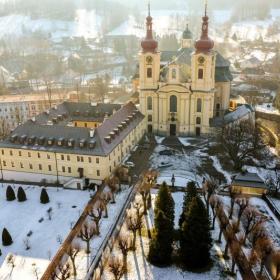This will be a tutorial lecture series for the Winter School in Abstract Analysis 2018, held in Hejnice of the Czech Republic.
 Abstract. I shall introduce and develop the theory of set-theoretic potentialism. A potentialist system is a collection of first-order structures, all in the same language $\mathcal{L}$, equipped with an accessibility relation refining the inclusion relation. Any such system, viewed as an inflationary-domain Kripke model, provides a natural interpretation for the modal extension of the underlying language $\mathcal{L}$ to include the modal operators. We seek to understand a given potentialist system by analyzing which modal assertions are valid in it.
Abstract. I shall introduce and develop the theory of set-theoretic potentialism. A potentialist system is a collection of first-order structures, all in the same language $\mathcal{L}$, equipped with an accessibility relation refining the inclusion relation. Any such system, viewed as an inflationary-domain Kripke model, provides a natural interpretation for the modal extension of the underlying language $\mathcal{L}$ to include the modal operators. We seek to understand a given potentialist system by analyzing which modal assertions are valid in it.
Set theory exhibits an enormous variety of natural potentialist systems. For example, with forcing potentialism, one considers the models of set theory, each accessing its forcing extensions; with rank potentialism, one considers the collection of of rank-initial segments $V_\alpha$ of a given set-theoretic universe; with Grothendieck-Zermelo potentialism, one has the collection of $V_\kappa$ for (a proper class of) inaccessible cardinals $\kappa$; with top-extensional potentialism, one considers the collection of countable models of ZFC under the top-extension relation; and so on with many other natural examples.
In this tutorial, we shall settle the precise potentialist validities of each of these potentialist systems and others, and we shall develop the general tools that enable one to determine the modal theory of a given potentialist system. Many of these arguments proceed by building connections between certain sweeping general features of the models in the potentialist system and certain finite combinatorial objects such as trees or lattices. A key step involves finding certain kinds of independent control statements — buttons, switches, ratchets and rail-switches — in the collection of models.



Pingback: Modal principles of potentialism, Oxford, January 2018 | Joel David Hamkins
Pingback: Philosophy of Mathematics, graduate lecture seminar, Oxford, Trinity term 2020 | Joel David Hamkins